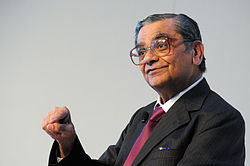

Starting in 1996, I woke up early on an October morning and saw who won the Nobel Prize in economics. I had a deal with the Wall Street Journal that I would tell one of the editors within an hour so whether I knew enough about the winner(s) to write an op/ed that morning for the next day’s print edition.
Fortunately, I’ve been able to do so for every year since then, except 1998 (when I didn’t know enough), 1999 and 2000 (when I was teaching a course in Prague), 2002 (when I was traveling in the U.K.) , 2007 (when I didn’t know enough), and 2010 (when I didn’t know enough.) Here’s the list of past winners.
The web has made my job easier.
One economist in an email discussion yesterday joked that I must have some pre-written pieces because I have a sense of who will win. Unfortunately, no. I haven’t yet predicted correctly. I haven’t even been in the ball park. I gave up producing about a decade ago.
I did tell the people in the email discussion that I used to go the library the weekend before and check out books by 3 or 4 economists who I thought were contenders, but I quit after a few years because I never got it right.
Which brings me to Jagdish Bhagwati.
I used to check out 3 or 4 books by Bhagwati, starting in the early 2000s and going to late in that decade. I’ve always thought he was deserving. I still do. He did some of the most careful and important work on international trade and protectionism. In my graduate course on trade at UCLA, we studied his book 1969 book Trade, Tariffs, and Growth carefully. He was a master at showing why every argument for tariffs but one was a second-best argument: there was always a more direct, less distortionary way of achieving a goal other than tariffs.
What was the one first-best argument for tariffs? If I recall correctly, it was that a tariff can help a country exploit its monopsony power against exporters. I pointed out on this blog over a year ago, that, believe it or not, that seems to be what President Trump did with some of his tariffs.
Back to Bhagwati. Another strong admirer of Bhagwati was the late Paul Samuelson. Here’s an excerpt from Samuelson’s admiring note on Bhagwati:
However, in closing I turn away from any vanities of career accomplishments to substance. In the struggle to improve the lot of mankind, whether located in advanced economies or in societies climbing the ladder out of poverty, Jagdish Bhagwati has been a tireless partisan of that globalization which elevates global total-factor – productivities both of richest America and poorest regions of Asia and Africa.
Bhagwati, by the way, wrote “Protectionism,” in The Concise Encyclopedia of Economics.
This is NOT a prediction that Bhagwati will win. I think the Nobel Committee is too into fashion. However, it sometimes uses the prize to make a statement about policy. Given how much of a beating free trade and globalization have taken in the political realm in the last few years, this would be a good time to make such a statement.

READER COMMENTS
Jon Murphy
Oct 11 2020 at 6:15pm
At least in his book Protectionism, that is the one first-best argument for tariffs. But, he notes, that the argument requires a lot of assumptions (such as a national comparative advantage, firms are not strategic, and the other nations do not retaliate) and thus are not very good policy in the real world (see Chapter 5, especially pages 105-108)
David Henderson
Oct 11 2020 at 10:07pm
You wrote:
Ooh, good point. I forgot to make it.
Also, the other point I forgot to make is that it’s first-best only from a nationalist viewpoint. Protectionism to exploit monopsony power has the same problem as all exploitations of monopsony power: it causes distortions. It’s the other country, or the other countries, that is (are) hurt.
Alexandre Padilla
Oct 11 2020 at 8:43pm
Anne Krueger and Jagdish Bhagwati would make more sense for their work on rent-seeking (or unproductive activities).
David Henderson
Oct 11 2020 at 10:08pm
I can see that.
Neel Chamilall
Oct 12 2020 at 8:28am
Thanks for this. Bhagwati was also influenced by the Austrian economist Gottfried to whom he dedicated his book entitled “Termites in the Trading System.” Paul Samuelson, whom you mention, also wrote a very nice article on Gottfried Haberler (with an explicit reference to Haberler’s “Austrian” roots). I find Bhagwati’s old, theoretical work very interesting contrary to his more recent attempts to write for a popular audience. I found “In Defence of Globalization,” for example to be an average book and “Termites…” a pompous one. Arvind Panagariya, who holds the Jagdish Bhagwati chair at Columbia and co-author of several works with Bhagwati, seems to me to be much better.
Pyrmonter
Oct 14 2020 at 12:37am
@ Alexandre + 1
Neither Bhagwati nor Krueger is young; both made (more or less contemporaneous) contributions to the political economy of trade and rent-seeking literature. Why several younger contributors (especially 2019’s winners) have received the award before them calls for some scrutiny. The Swedes are at risk of another Baumol.
Atanu Dey
Oct 14 2020 at 2:43pm
@Pyrmonter +1
Bhagwati & Krueger richly deserved 2019 Nobel Memorial Prize in econ. But that committee moves in strangely mysterious ways.
Comments are closed.